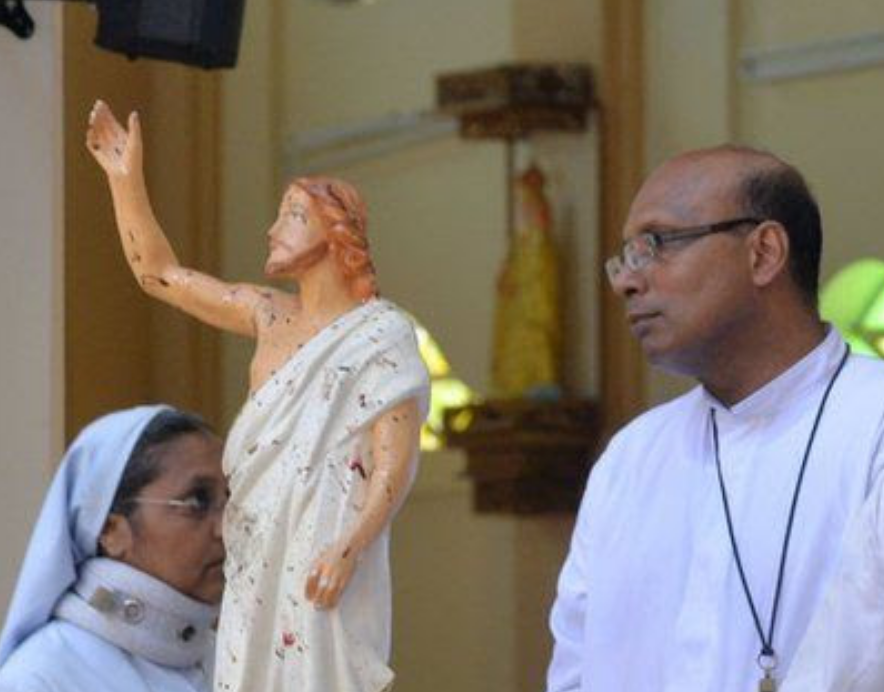The series of coordinated blasts in Sri Lanka on Easter Sunday — which killed nearly 300 innocents across churches, luxury hotels and other key installations — exposed the vulnerability of the island nation to a “new brand of terror,” suspectedly linked to Islamist terrorism. The LTTE-led militancy from Tamil-origin northern provinces had bled the nation to its depths for long years, but recent years saw Sri Lanka returning to peaceful times. Its tourism industry, a mainstay of the economy, was regaining its momentum after the many years of serious security concerns, and here comes this new set of terror attacks. It is yet to be ascertained who its perpetrators were, though the blame is now on the Islamists.
It seems like the security forces in Sri Lanka failed to take seriously the advance alerts about a possible terrorist attack. There was nothing surprising about this, considering the poor track record of the island nation’s security apparatus. An oft-cited joke in Sri Lanka is that if a dog barked, cops there would take to their heels. We in India also are used to such lapses on a regular basis. Former President Mahinda Rajapaksa had secretly taken the help of the Pakistani security establishment to train a new band of hard-edged cops and soldiers, which helped him in finally putting the LTTE on the defensive and eliminating its leadership structure. At that time in history, there was also likelihood that Pakistani soldiers were involved in this offensive, on request from Sri Lanka. The complacence of the previous governments was laid bare only when Rajapaksa started acting tough. But, the peace he ushered in seems to be short-lived. Nothing hints that the LTTE had any role to play in the present round of bombings. It is down in the dumps. It looks like the target was principally the foreigners in the tourism-hubs, mainly those from the West. And the Christian community of Sri Lanka.
The harried nation’s defence minister attributed the attacks, nine blasts in all, to the followers of “religious extremism,” while another minister said the police force had been alerted about a potential attack from the Islamist terror group, styled as the National Thowheed Jamaath (NTJ) Moslems form a minority group of some 10 per cent in the prominently Buddhist nation. Notably, the senior minister also castigated the police brass for its “utter negligence and incompetence”. In recent times, Sri Lanka came under a period of political uncertainty as the relations between President Maitripala Sirisena and Prime Minister Ranil Wickremesinghe soured, leading up to a near halt of governmental functioning and court interventions. Former president Rajapaksa and his men waited in the wings to seize power. All these were bound to have had a telling effect on the overall governance and security upkeep. The serial blasts in and around Colombo on Easter Sunday could also have international ramifications. The recent attack on Moslem migrant worshippers in Mosques in New Zealand, called Christchurch shootings, may offer investigators some directions. The fact that these attacks targeted religious institutions and international tourists points to the possible involvement of international jihadist groups.
Christians make up only about 7 per cent of the population of Sri Lanka. The Easter attack has made their places of worship targets of attack, a shift from previous such attacks that primarily targeted only Evangelical churches. The Sri Lankan police had in January uncovered a large cache of explosives from an IS training camp based in the north. It was found that these were meant for use against Buddhist monuments in Anuradhapura. The wide global networks that terrorist organisations such as the IS are operating have the potential to derail nations, especially those such as Sri Lanka which depend on tourism to a large extent to meet its needs. The radicalisation of Moslems may have its origin in instigation by Sinhalese Buddhist extremists. The island nation has had its fair share and then some more of violence. It is easy to say that Sri Lanka should now nip the new threat in the bud to ensure that its future is not written in blood but, on a global level, terror has no shape, size or colour anymore. People in countries such as Sri Lanka, India, Indonesia or even France or New Zealand may think a ‘strong leader’ can handle matters on their behalf but all that is a pipe dream. Only an aware citizenry and an inclusive society can help protect us from this kind of scourge.
